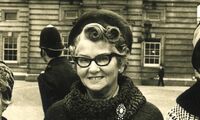Mary Whitehouse: Difference between revisions
(Created page with "Category:Negative Influences on Morrissey Category:Influences on Morrissey - Politics ==Relevance==") |
No edit summary |
||
| Line 1: | Line 1: | ||
[[Category:Negative Influences on Morrissey]] | [[Category:Negative Influences on Morrissey]] | ||
[[Category:Influences on Morrissey - Politics]] | [[Category:Influences on Morrissey - Politics]] | ||
[[File:Mary Whitehouse.jpg | 200px | right | thumb |Mary Whitehouse]] | |||
==Relevance== | ==Relevance== | ||
{{Page | |||
|WikipediaPageTitle=Mary_Whitehouse | |||
}} | |||
{{PageDate}} | |||
Latest revision as of 08:14, 25 February 2023
Relevance
Mentioned In
- EXCLUSIVE: Morrissey - Music-News.com (May 27, 2019)
- UK Chart Position. - Morrissey Central (May 31, 2019)
- Morrissey Interview 2022. - Sam Esty Rayner / YouTube (November 27, 2022)
- In Conversation With Morrissey - Gabfest (April 3, 2023)
Wikipedia Information
 |
Constance Mary Whitehouse (née Hutcheson; 13 June 1910 – 23 November 2001) was a British teacher and conservative activist. She campaigned against social liberalism and the mainstream British media, both of which she accused of encouraging a more permissive society. She was the founder and first president of the National Viewers' and Listeners' Association, through which she led a longstanding campaign against the BBC. A hard-line social conservative, she was termed a reactionary by her socially liberal opponents. Her motivation derived from her Christian beliefs, her aversion to the rapid social and political changes in British society of the 1960s, and her work as a teacher of sex education. Whitehouse became an art teacher, at the same time becoming involved in evangelical Christian groups such as the Student Christian Movement (which became increasingly more liberal leading up to, and after, a 1928 split with the Universities and Colleges Christian Fellowship) and Moral Re-Armament. She became a public figure via the Clean-Up TV pressure group, established in 1964, in which she was the most prominent figure. The following year she founded the National Viewers' and Listeners' Association, using it as a platform to criticise the BBC for what she perceived as a lack of accountability and excessive use of bad language and portrayals of sex and violence in its programmes. During the 1970s she broadened her activities and was a leading figure in the Nationwide Festival of Light, a Christian campaign that gained mass support for a period. She initiated a successful private prosecution against Gay News on the grounds of blasphemous libel, the first such case for more than 50 years. Another private prosecution was against the director of the play The Romans in Britain, which had been performed at the National Theatre. Whitehouse's campaigns continue to divide opinion. Her critics have accused her of being a highly censorious, bigoted figure, and her traditional moral convictions brought her into direct conflict with advocates of the sexual revolution, feminism, children's rights, and LGBT rights. Others see her more positively and believe she was attempting to halt a decline in Britain's moral standards. According to Ben Thompson, the editor of an anthology of Whitehouse-related letters published in 2012, "From [...] feminist anti-pornography campaigns to the executive naming and shaming strategies of UK Uncut, her ideological and tactical influence has been discernible in all sorts of unexpected places in recent years."
